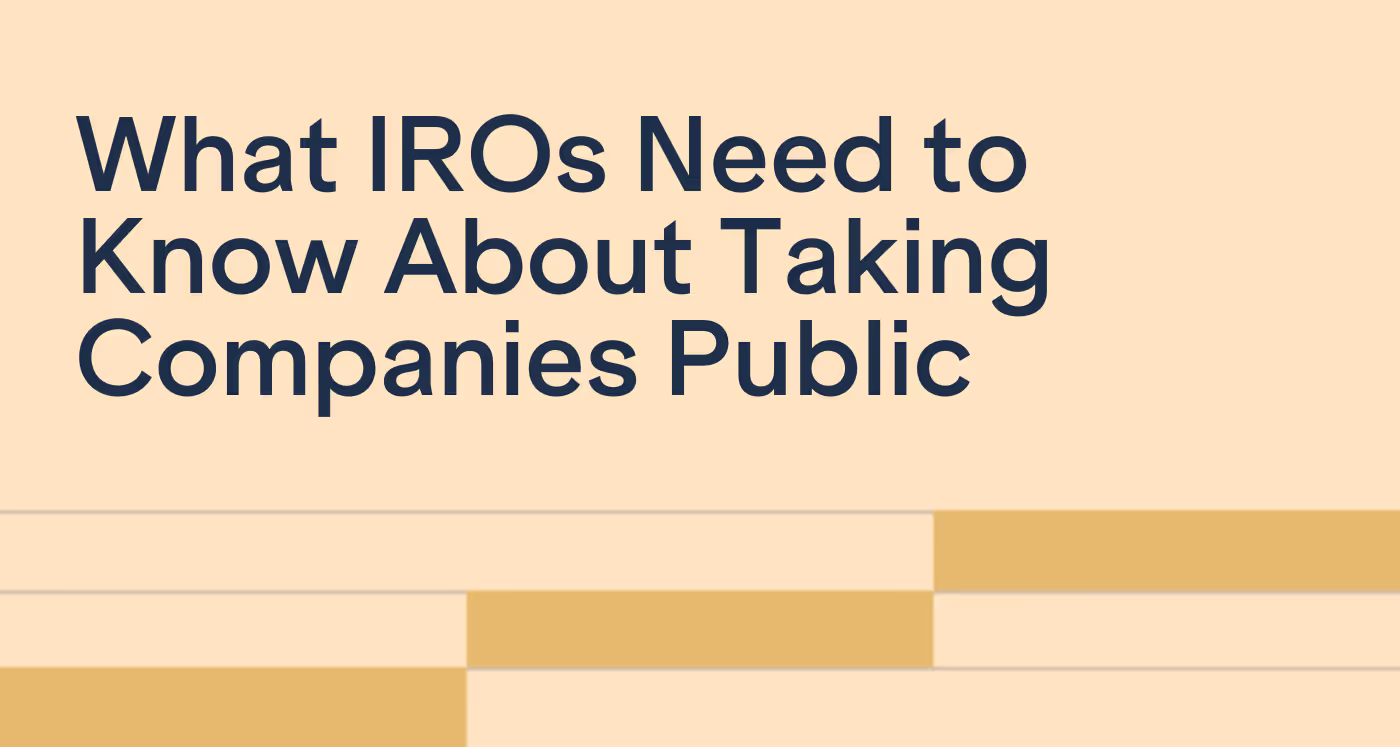
How to Build Effective Investor Targeting and Outreach Strategies for Small-Mid-Cap Companies
Learn how seasoned IR veterans are executing targeting strategies for small-mid-cap companies.

As a company grows and progresses through the different stages of its life cycle, eventually, it will reach a point where stakeholders need to decide whether to stay private or go public. While the reasons underpinning the decision to become a publicly traded company will vary from business to business, the time, cost and reporting requirements once public is typically much more consistent across companies. This article is an in-depth explainer for any business leader that wants to weighs both the costs and benefits of staying private or going public.
The decision to remain private or go public is a critical one that many companies will face at some point. As management teams assess whether or not the time is right to make the call, it is essential to be mindful of the risks and costs associated with each choice.
Reduced access to broader sources of capital: Financing options are typically limited to private equity, venture capital and debt investors who may not be able to offer as favorable terms as public market investors.
Less liquid capital structure: It can be more challenging for employees and investors to monetize their ownership of the company on a timely basis.
Less awareness among investors and the broader public: There is a competitive branding advantage often associated with being publicly listed as you are more in the “public eye.”
More challenging to raise capital quickly: Fundraising processes can take anywhere from weeks to months to close versus overnight to within a few days in the public markets.
Regulatory and reporting requirements: Each exchange and country has its own set of reporting requirements and regulations that must be strictly adhered to, often resulting in additional time and investment.
Increased time commitment from management: In addition to the time required from management to oversee and prepare for quarterly reporting and earnings calls, C-suite must also dedicate a significant amount of time (a recent study by Deloitte indicated at least 20%) to areas such as investor relations (particularly for a newly public company).
Public company costs: These costs include at minimum accounting, legal and listing fees, and can range from $200,000-$400,000 before considering any expenses related to underwriting.
Heightened scrutiny on performance and increased accountability for achieving guidance/targets: Company performance is highly scrutinized and marked to market in real time by a much larger group of investors, which significantly increases the magnitude of meeting or missing expectations.
In addition to the costs and risks stated above, there are also several benefits that each state affords a company and its employees. Understanding when and how these benefits are most relevant (and when they apply less) to the stage your company is in can be critical in ultimately influencing this decision.
Much easier to repurchase shares: Repurchasing shares is significantly easier to do as a public company and can be a highly effective capital allocation decision that returns capital to shareholders in a tax-efficient manner and provides share price support during volatile market conditions.
Ability to issue equity at high valuations: When timed correctly, this can be a value-enhancing strategic decision that has the potential to accelerate the compounding of shareholder capital.
Easier to raise large amounts of capital quickly: The public market infrastructure that supports rapid access to broader sources of capital is a unique advantage, particularly for companies looking to pursue ambitious growth plans.
Access to more liquid and more permanent sources of capital: The enhanced liquidity present in public versus private markets attracts more permanent sources of capital, i.e., capital that does not have to be returned to investors over a specified period, which is more supportive of management running the business for long-term success.
Limited disclosure of financials and KPIs: Maintaining confidentiality of key metrics and performance can serve as an important advantage, particularly if your competitors publicly disclose the same information.
Reduced focus on short-term (quarterly) performance and more supportive of long-term planning: Performance is typically scrutinized much more closely quarterly for publicly traded companies. This can place pressure on public management teams to run the business to hit short-term targets—potentially to the detriment of long-term performance. Since private companies do not have this same level of short-term pressure, there is more flexibility for the company to take a long-term strategic approach to shareholder value creation.
Lower corporate governance and capital structure complexity: Private companies have significantly fewer shareholders than public ones and their boards are typically much smaller. This reduces corporate governance and capital structure complexity, which should increase management’s ability to act quickly and decisively.
Illiquidity premium not as significant as it once was: Before the global financial crisis, private companies often traded at a discounted valuation to their public counterparts due to a lack of liquidity (known as the “illiquidity premium”). However, with liquidity in the private markets increasing significantly in recent years due to a much more actively traded secondary market, the relative liquidity discount versus public peers has contracted, making it more appealing to stay private for longer.
In a follow-up article, I’ll offer my insight about discerning when the time may be right to go public or stay private, the implications either state can have on a company’s cost of capital, and give ideas for how a public company can circumvent the potential costs mentioned above.
The information provided here is not investment, tax or financial advice. You should consult with a licensed professional for advice concerning your specific situation.
Learn how Irwin helps public companies raise capital.

Learn how seasoned IR veterans are executing targeting strategies for small-mid-cap companies.

Elizabeth Librizzi breaks down the secrets of buy-side corporate access to help investor relations professionals utilize buy-side firms.

What IROs Need to Know About Taking Companies Public: Insights from award winning investor relations thought leader Catherine Buan.